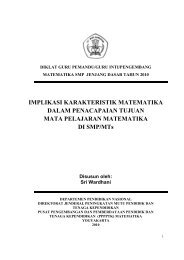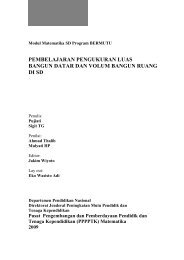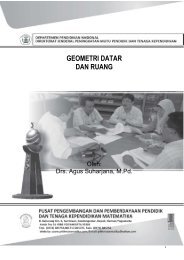25 Biggest Mistakes Teachers Make and How to Avoid Them
25 Biggest Mistakes Teachers Make and How to Avoid Them
25 Biggest Mistakes Teachers Make and How to Avoid Them
You also want an ePaper? Increase the reach of your titles
YUMPU automatically turns print PDFs into web optimized ePapers that Google loves.
Teacher Confessions of Worst Treatment of a Child<br />
beliefs (B<strong>and</strong>ura, 1969) or their confidence about their capabilities. As a consequence,<br />
they may feel inadequate or incompetent, feelings that foster feelings<br />
of defensiveness or resentment. <strong>Teachers</strong>’ biased beliefs <strong>and</strong> perceptions<br />
about students that are ethnically <strong>and</strong> economically different <strong>and</strong> teachers’<br />
limited exposure <strong>to</strong> such children may manifest as culture clash <strong>and</strong> incite discrimina<strong>to</strong>ry<br />
behavior. Unfortunately, some preservice teachers view teaching<br />
as a “soft” profession. They come in<strong>to</strong> the profession unaware <strong>and</strong> unprepared<br />
for the “hard” side of teaching such as student misconduct, drug use,<br />
assault, insubordination, <strong>and</strong> so on. Such beliefs are often the basis of negative<br />
classroom interactions <strong>and</strong> possible academic trauma for students.<br />
There are a number of psychosocial fac<strong>to</strong>rs underlying the causes of aberrant<br />
teacher behavior. Some of them are listed below, accompanied by recommendations<br />
for avoiding the negative outcomes of these fac<strong>to</strong>rs.<br />
Sometimes teachers experience a discrepancy between their actual self <strong>and</strong><br />
their ideal self. Such a perception fosters feelings of inadequacy, discontent, dissatisfaction,<br />
<strong>and</strong> displaced anger. To avoid this perception, they could develop a<br />
more realistic perspective of their strengths <strong>and</strong> weaknesses <strong>and</strong> make a concerted<br />
effort <strong>to</strong> close the gap. Substance abuse is a reality for millions of people;<br />
teachers are no exception. <strong>Teachers</strong> under the influence of alcohol or drugs are<br />
very likely <strong>to</strong> be irritable, reactive, <strong>and</strong> short on patience. Fortunately, there are<br />
rehabilitation facilities, professional counseling <strong>and</strong> support groups <strong>to</strong> help them<br />
manage their addiction. A family his<strong>to</strong>ry of substance abuse has its own set of<br />
problems. People from such families are referred <strong>to</strong> as adult children of alcoholics.<br />
They have what their support groups refer <strong>to</strong> as a laundry list of problems<br />
that can be directly attributed <strong>to</strong> the dysfunction of the addicts in their family,<br />
parents in particular. To minimize the negative outcome of this family situation,<br />
teachers can avail themselves of the positive support groups that help them <strong>to</strong><br />
recognize <strong>and</strong> minimize the effects of their childhood, by stressing that childhood<br />
is over <strong>and</strong> they must find positive ways of coping with life <strong>and</strong> move on.<br />
Sadly, teachers who have had an oppressive or abusive teacher in the past<br />
may identify with the oppressor because they know what hurts or what has<br />
a negative effect because it was done <strong>to</strong> them. They may see the oppressor as<br />
having the power <strong>and</strong> that is what they want, the power <strong>and</strong> control that<br />
they did not have as a child. Those teachers who have experienced being a<br />
powerless child dealing with aversive academic experiences can put their<br />
past situation in<strong>to</strong> perspective through guided imagery. Using this technique,<br />
they mentally place themselves in a protective bubble <strong>to</strong> mentally<br />
revisit the past scenario of their mistreatment, <strong>to</strong> be reminded that it was not<br />
a desirable situation, but they lived through it, <strong>and</strong> <strong>to</strong> assure that they would<br />
never want <strong>to</strong> emulate the offending teachers’ behavior.<br />
Unfortunately, allergies, physiological imbalances such as menopause,<br />
PMS, bipolar disorder <strong>and</strong> other mental illnesses can fuel out-of-control<br />
teacher behavior. Fortunately, negative outcomes can be avoided with appropriate<br />
medical help, counseling, <strong>and</strong> behavioral management of various disorders.<br />
Some teachers have an excessive need for control; they feel they can’t trust<br />
245





